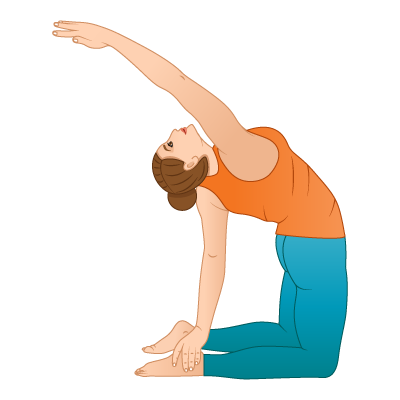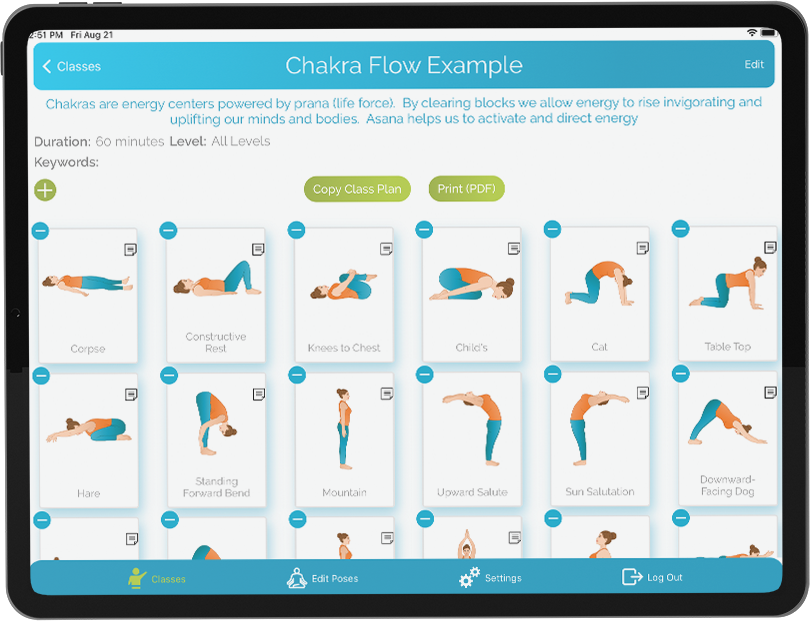Half Camel Raised Toe Pose
Ardha Ustrasana

STEPS
The Half Camel Raised Toe Pose puts forth a challenging spin on the classic Half Camel posture, by raising the toe closer to the upper arm. If the classic Camel Pose was a deep intense backbend, the Half Camel Raised Toe Pose nudges you to control your balance on one knee, while stretching the hamstrings. All Camel Pose Variations are great poses to get your students to be more courageous about attempting backbends, as practising this pose helps them overcome their ‘fear of falling’ backwards. Most new Yoga practitioners will find this pose to be a challenge, as it requires a certain amount of flexibility in the back, hamstrings and ankles.
To practice the pose, begin in Hero’s pose as it warms up the ankles as prep for the pose. After staying in the pose for a few seconds, move to a high kneeling position. In this position, be sure to tuck your tailbone in while lengthening the spine and strengthening your core and back. Your legs are hip-width apart. Bring hands to the small of the back for support and open chest and heart, by pointing chest to ceiling. Open shoulders and roll them downwards towards each other. Pay caution that there is no tension in the neck and jaw area.
Once the chest is open and the shoulders relaxed, reach right arm a little further away from the right foot to place the palm flat on the mat. This creates a subtle backbend. Use the left hand to guide right toe towards the right upper arm. Ensure the right foot is comfortable and ‘tucked’ into the right upper arm. Once that position with the right foot is secured, lift left arm up by rotating the shoulders outwards to extend behind. Breathe deeply for a few seconds, while relaxing the body.
To release the pose, push hips forward to come out of the backbend. Release the foot grasp on the upper right arm, and resume hero’s pose again.
Repeat the same steps on the left side.
TEACHER QUEUES
VISUALIZATION COMMENTS
While in kneeling position, ensure both knees and pelvis are soft and not tensed. While arching back imagine a thread connecting the chest to the sky, visualising this thread as a strong thread serves as an anchor to this pose, which some students may find as intimidating. This thread is opening the chest further as one reaches to place the foot in the arm. While extending the left arm, one can imagine as though they are reaching for their goals, which are within reach. One can also philosophise further deeper into the meaning of this pose while teaching this in class.
TECHNICAL COMMENTS
It is important to have the right alignment in this pose to receive all its benefits. For starters, ensure that while kneeling, the knees are hip-width apart. While in this posture, it is also important that you don’t overarch and tuck the tailbone. Open the chest cavity, by pointing chest up and outwards. After the right foot is firmly secured in the right upper arm, open the left shoulder by extending the arm backwards.
BENEFIT COMMENTS
- Opens chest
- Increases flexibility of the spine
- Relieves tight shoulders
- Strengthens ankles and core muscles
- Invigorates the abdominal muscles
WATCH OUT FOR
- Strain in the neck and throat
- Tight hamstrings
- Tight back muscles
- Overarching the back
- Shoulders rotating inwards
CONTRAINDICATIONS
- Back injury
- Ankle injury
- Tight shoulders
- High blood pressure
MODIFICATIONS
- Practised with the hips facing the wall
- If the student is a beginner, extend and arch back by placing both hands on lower back only
- Use a chair as a prop behind the legs and use the seat of the chair to support hands while opening chest.
VARIATIONS
- Grip right ankle with hand and extend left arm and vice versa. This is the classic half Camel pose.
- Place hands on hips to open back gently. This is beginner Camel pose variation.
- Pigeon Pose
YOGA COUNTER POSES
Written By: Adithi Mathews
Adithi Mathews is a 500 Hr CYT,yoga practitioner and writer living in Germany. More information about Adithi can be found on www.adithimathews.com



